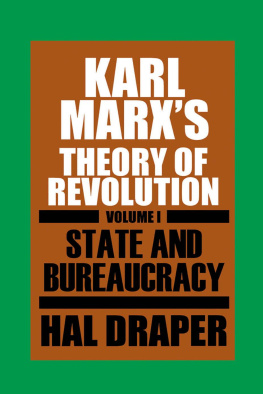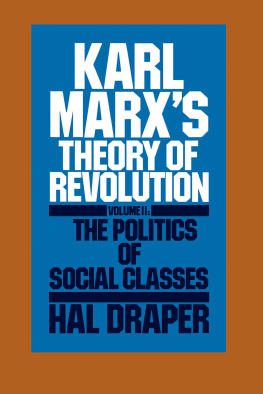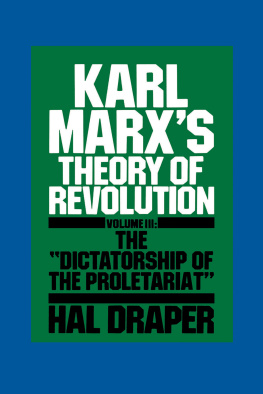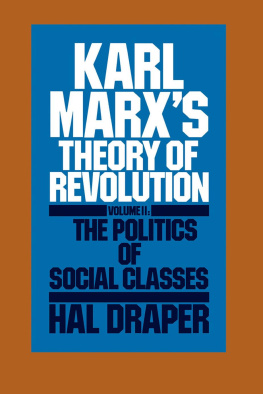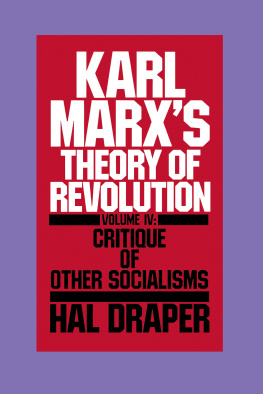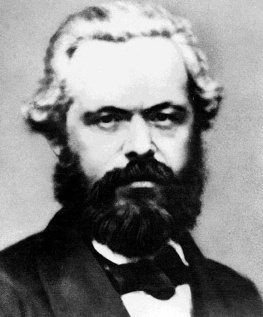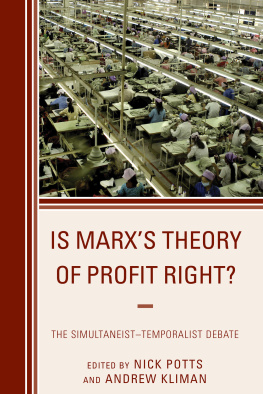Hal Draper - Karl Marx’s Theory of Revolution I
Here you can read online Hal Draper - Karl Marx’s Theory of Revolution I full text of the book (entire story) in english for free. Download pdf and epub, get meaning, cover and reviews about this ebook. year: 1977, publisher: Monthly Review Press, genre: Politics. Description of the work, (preface) as well as reviews are available. Best literature library LitArk.com created for fans of good reading and offers a wide selection of genres:
Romance novel
Science fiction
Adventure
Detective
Science
History
Home and family
Prose
Art
Politics
Computer
Non-fiction
Religion
Business
Children
Humor
Choose a favorite category and find really read worthwhile books. Enjoy immersion in the world of imagination, feel the emotions of the characters or learn something new for yourself, make an fascinating discovery.
- Book:Karl Marx’s Theory of Revolution I
- Author:
- Publisher:Monthly Review Press
- Genre:
- Year:1977
- Rating:4 / 5
- Favourites:Add to favourites
- Your mark:
- 80
- 1
- 2
- 3
- 4
- 5
Karl Marx’s Theory of Revolution I: summary, description and annotation
We offer to read an annotation, description, summary or preface (depends on what the author of the book "Karl Marx’s Theory of Revolution I" wrote himself). If you haven't found the necessary information about the book — write in the comments, we will try to find it.
Karl Marx’s Theory of Revolution I — read online for free the complete book (whole text) full work
Below is the text of the book, divided by pages. System saving the place of the last page read, allows you to conveniently read the book "Karl Marx’s Theory of Revolution I" online for free, without having to search again every time where you left off. Put a bookmark, and you can go to the page where you finished reading at any time.
Font size:
Interval:
Bookmark:
Thank you for buying this ebook, published by NYU Press.
Sign up for our e-newsletters to receive information about forthcoming books, special discounts, and more!
Sign Up!
About NYU Press
A publisher of original scholarship since its founding in 1916, New York University Press Produces more than 100 new books each year, with a backlist of 3,000 titles in print. Working across the humanities and social sciences, NYU Press has award-winning lists in sociology, law, cultural and American studies, religion, American history, anthropology, politics, criminology, media and communication, literary studies, and psychology.
KARL MARXS THEORY OF REVOLUTION
by Hal Draper
I: STATE AND BUREAUCRACY

Copyright 1977 by Hal Draper
All rights reserved
Library of Congress Cataloging in Publication Data
Draper, Hal.
Karl Marxs theory of revolution.
Bibliography: p. 709
Includes index.
CONTENTS: I. State and bureaucracy
1. Marx, Karl, 1818-1883Political science
Collected works. 2. RevolutionsCollected works.
I. Title.
JC233.M299D7 301.592 76-40467
ISBN: 0-85345-387-X cloth
ISBN: 0-85345-461-2 paper
Monthly Review Press
146 West 29th Street, Suite 6W
New York, NY 10001
www.monthlyreview.org
To
ANNE DRAPER
(1917-1973)
Trade union organizer,
champion of workingwomens liberation,
and revolutionary Marxist
BOOK I
BOOK II
This book was originally published in two hardcover volumes. In order to make the work available in paperback at the lowest possible price, we have put the two volumes together for the paperback edition. The notes to Book I have been moved to the end of the combined text, leaving a gap in the pagination.
It should be useful to begin with a statement of what this book attempts to do.
The goal has been a full and definitive treatment of Marxs political theory, policies, and practice. Needless to say, this goal is unattainable, but it has served to determine the form and contents, scope and limitations of the work.
The word political is one key. Its ambiguities are legion, even apart from its association with electoral activity in general and unscrupulous maneuvering (dirty politics) in particular. The question of a scientific definition is touched on in ; here let us make do with a process of elimination.
Of the making of books on Marx and Marxism there is no end if the books are on Marxs philosophy, economics, or social-historical theory (historical materialism). This still leaves everything else, which in fact constitutes the bulk of the forty-three volumes of the Marx-Engels Werke. True, this everything else is more miscellaneous than politics, but it will do as a first approximation. The scope, then, is the same as Pooh-Bahs, who after all comes on stage with one of the first essays on the role of the state bureaucracy to be found in the literature.
Marxs political ideas have not generally interested marxology (one of the most curious of industries) except as incidental appendages to the grand theory. The exceptions are few if outstanding. To be sure, a theory of the state usually has to be stated somewhere, and a reference to the dictatorship of the proletariat is dictated by custom. Beyond that, there are few treatments, even inadequate ones, of most of the questions in this area.
The philosophic side of Marxs development has been covered more copiously than any other aspect of Marxs activity or thought, from a multiplicity of viewpoints.
This lopsided situation is one of the difficulties here, for almost every heading represents an almost virgin field. The situation is curious because it is customary to quote Engels overall appreciation of Marx as before all else a revolutionist, yet to ignore the close attention he paid to a host of problems of revolution beyond the indispensable grand theory. It is to bend the stick the other way that this work is titled Karl Marxs Theory of Revolution rather than Political Theory, which might be interpreted too narrowly.
It is significant that, in the graveside speech on Marx alluded to above, Engels made a similar distinction between Marx the man of science and Marx the revolutionist. Formally speaking, Marx was a revolutionary also in his scientific work; less formally speaking, by the revolutionist Engels meant Marx the political man.
But this [the man of science] was not even half the man. Science was for Marx a historically dynamic, revolutionary force.
For Marx was before all else a revolutionist. His real mission in life was to contribute, in one way or another, to the overthrow of capitalist society and of the state institutions which it had brought into being, to contribute to the liberation of the modern proletariat, which he was the first to make conscious of its own position and its needs, conscious of the conditions of its emancipation. Fighting was his element. And he fought with a passion, a tenacity, and a success such as few could rival.
It is this Marx, the political man, that is our subject.
Besides the limitation to the political field, there are other self-imposed limitations that affect the scope of the book. I have resisted frequent temptations to follow questions farther than Marx and Engels themselves, into the discussions and views of the subsequent Marxist movement, let alone bring them up to date. To do otherwise, even sketchily, would take far more space without being definitive. References to later ideas and developments have been made only where they throw some special light on the subject under discussion.
On the other hand, in an important respect the scope of this work is broader than the usual approach to Marxs theory of the state, which tends to concentrate on the developed capitalist state. Here the emphasis is on Marxs world-historical view of the state. More specific material relating to the bourgeois state will be found in subsequent volumes. This approach is of a piece with Marxs. One must remember that most of the states that Marx had occasion to discuss were not capitalist statesas yeteven in Europe, let alone throughout the rest of the world. From the standpoint of theory this is a good thing, since no phenomenon can be thoroughly understood if only one specimen or type is available for examination. The literature of Marxism and marxology is unfortunately full of statements about Marxs views which actually apply only to capitalism and the bourgeois era, and which require at least considerable qualification as soon as the focus is widened to include most of the world and world history. It is a form of ethnocentrism.
The general limitation of the subject matter to politics creates a practical dilemma. On the one hand, the assumption is that the reader is more or less acquainted with the main lines of the basic social and economic theory underlying Marxs political conceptions. On the other hand, it has been impossible to hold to this assumption where issues in social and economic theory are either less well known or more commonly misstated. In the latter cases, some discussion of the underlying theory has been included. For this reason is entirely devoted to an aspect of Marxs social theory.
The problem just stated becomes most acute in and other sections dealing with the concept of
Font size:
Interval:
Bookmark:
Similar books «Karl Marx’s Theory of Revolution I»
Look at similar books to Karl Marx’s Theory of Revolution I. We have selected literature similar in name and meaning in the hope of providing readers with more options to find new, interesting, not yet read works.
Discussion, reviews of the book Karl Marx’s Theory of Revolution I and just readers' own opinions. Leave your comments, write what you think about the work, its meaning or the main characters. Specify what exactly you liked and what you didn't like, and why you think so.

